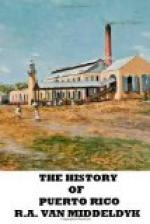These were the buccaneers and filibusters of that period, the most lawless class of men in an age of universal lawlessness, the refuse from the seaports of northern Europe, as cruel miscreants as ever blackened the pages of history.
The buccaneers derived their name from the Carib word “boucan,” a kind of gridiron on which, like the natives, they cooked their meat, hence, bou-canier. The word filibuster comes from the Spanish “fee-lee-bote,” English “fly-boat,” a small, swift sailing-vessel with a large mainsail, which enabled the buccaneers to pursue merchantmen in the open sea and escape among the shoals and shallows of the archipelago when pursued in their turn by men-of-war.
They recognized no authority, no law but force. They obeyed a leader only when on their plundering expeditions. The spoils were equally divided, the captain’s share being double that of the men. The maimed in battle received a compensation proportionate to the injury received. The captains were naturally distinguished by the qualities of character that alone could command obedience from crews who feared neither God nor man.
One of the most dreaded among them was a Frenchman, a native of Sables d’Olonne, hence called l’Olonais. He had been a prisoner of the Spaniards, and the treatment he received at their hands had filled his soul with such deadly hatred, that when he regained his liberty he swore a solemn oath to live henceforth for revenge alone. And he did. He never spared sex or age, and took a hellish pleasure in torturing his victims. He made several descents on the coast of this island, burned Maracaibo, Puerto Cabello, Veragua, and other places, and was killed at last by the Indians of Darien.
Sir Henry Morgan, a Welsh aristocrat turned pirate, was another famous scourge of the Spanish colonies. His inhuman treatment of the inhabitants of Puerto Principe, in 1668, is a matter of history. He plundered Porto Bello, Chagres, Panama, and extended his depredations to the coast of Costa Rica. He used to subject his victims to torture to make them declare where they had hidden their valuables, and many a poor wretch who had no valuables to hide was ruthlessly tortured to death.
Pierre Legrand was another Frenchman who, after committing all kinds of outrages in the West Indies, passed with his robber crew to the Pacific and scoured the coasts as far as California.
The atrocities committed by a certain Montbras, of Languedoc, earned him the name of “the Exterminator.”
* * * * *
When the first buccaneers made their appearance in the Antilles (1520), the Windward Islands were still occupied by the Caribs. Here they formed temporary settlements, which, by degrees, grew into permanent pirates’ nests. In some of these islands they found large herds of cattle, the progeny of the first few heads introduced by the early Spanish colonists, who afterward abandoned them. In 1625 a party of English and French occupied the island San Cristobal. Four years later Puerto Rico, being well garrisoned at the time, the governor, Enrique Henriquez, fitted out an expedition to dislodge them, in which he succeeded only to make them take up new quarters in Antigua.




